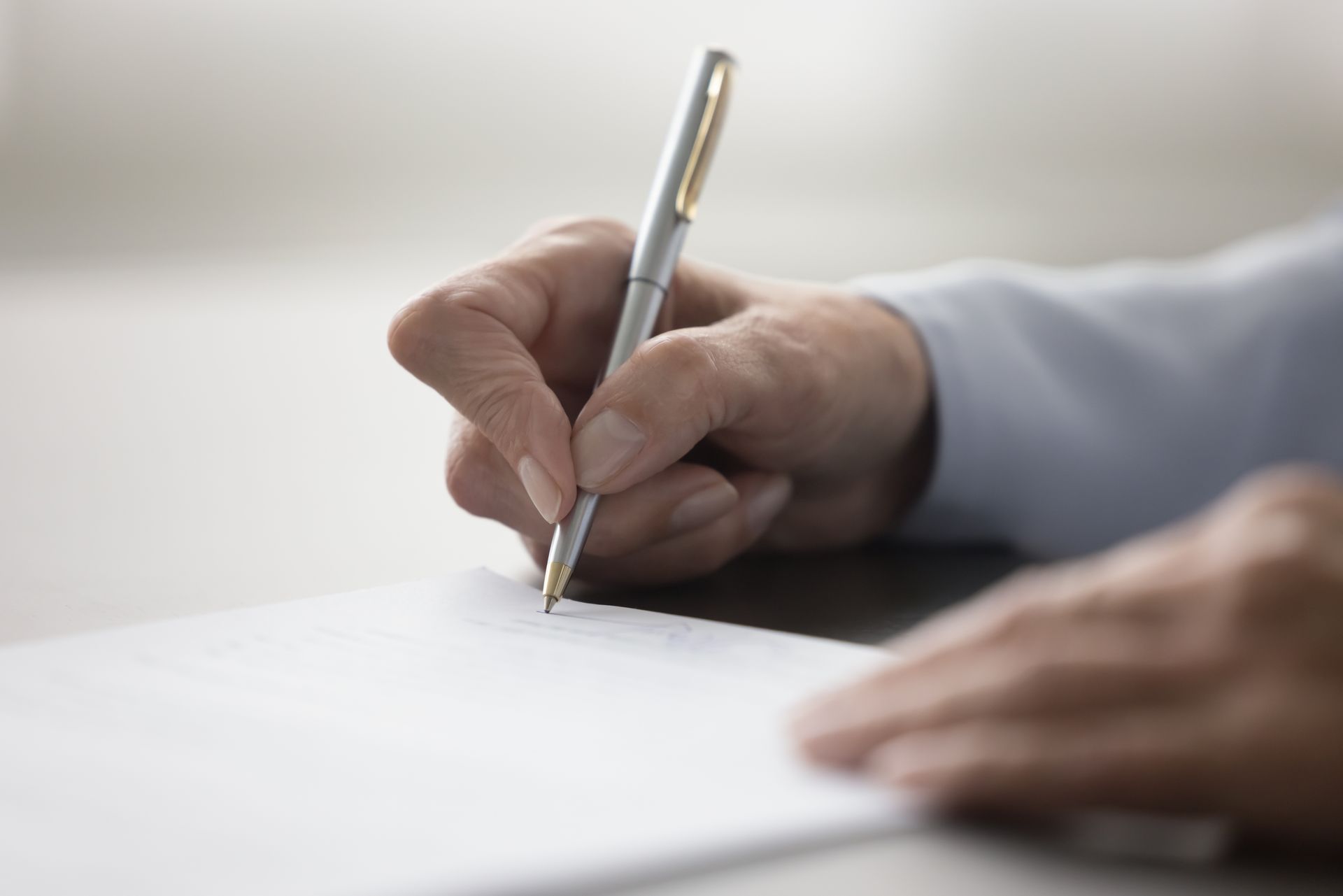Writing a Will in New York: Your No-Nonsense Guide to Getting It Done
As a topic that is brought to our desks over and over through the day, we wanted to tell you with the kindest intention: Intentions don’t count when a will is required.

You may mean well - but if your will isn’t properly prepared and executed, your hopes for your family and your legacy could be lost in probate, potentially for years or for forever. So, if you’re wondering "how do I write a will?" - you’re in the right place. This is the actionable guide to preparing for the conversation with your estate planning attorney. While we’d love to be able to tell you what you’re hoping - “I don’t really need an attorney for this, right?” Yes. Yes you do, no ifs ands or buts. There’s too much at stake and it is too easy to miss important details and mess up. We’ll cover what to gather, why it matters, and how doing it the right way now can make a world of difference later. We thought we’d teach you a few of the ins and outs of writing an iron-clad will, how to navigate even the trickiest of situations for making sure that your family keeps as much of your estate as possible and NOT the State of New York, and what on earth an attorney actually does for you in this process!
Collect Your Assets, Debts, & People
Congratulations! Taking an actual first step towards having a will written is usually the biggest challenge for people! Here’s what you’re going to want to start compiling to get started:
Assets: What you own - from your home, vehicles, savings, bank accounts, investments, to business ownership and so on. Note how each asset is titled and whether a beneficiary is already designated (like on a retirement or life insurance policy). Speaking of beneficiaries, checking this on each of your accounts (tedious, we know) is also an important step of compiling this list of assets.
Debts: This includes mortgages, personal & student loans, credit cards, outstanding balances and so on. Your estate must address these, which can impact distributions to heirs.
Documents: Originals or copies of any existing wills, power of attorney documents, health care proxy documents, living will documents, HIPAA authorizations, prenuptial or post-nuptial agreements, business agreements and other documents, trust agreements and other information, house and other real estate deeds, car titles, and any other key life documents such as previous divorce documents, child support, etc.
People: Your next of kin and other loved ones - for example: your spouse, your children, and so on (obtaining this information is critical and will depend on your situation), potential executors, potential agents in a power of attorney, health care proxy, potential guardians for minors, potential trustees and those individuals and/or charities you want to benefit. Identifying any family dynamics or potential conflicts can also be helpful to flag early on.
Why do this? It shows your estate planning attorney what you truly own, who are your next-of-kin, who you care about, who you trust to be in important roles in your legal documents, what legal knots that may need unraveling and so on. It also saves you a lot of time and establishes a better foundation in moving forward with your estate planning attorney!
Why Preparation Makes Everything BetterEmpty heading
Saving Time & Emotional Stress
The more organized you are, the fewer surprises and hiccups we run into down the road. This means faster meetings, and more meaningful questions & decisions. Your estate planning attorney isn’t the person who is going to track down all of your information for you; they’re guiding you along the way. Your estate planning attorney doesn’t know the people in your life like you do, but, together you can gain important insights into your planning.
Helps avoid complications
Assets can be overlooked, beneficiary designations may override your will, and debts can shave down inheritances before loved ones see a cent. Knowing titles and designations lets your estate planning attorney tailor solutions and provide possible ways to make things better into the future.
Guards against unintended consequences
Thoughtful planning is the best defense against unintended consequences. Checking things now prevents surprises later on. For example, is your home titled in your name, your spouse’s, or your parents’? Who are you nominating to care for your minor children? Who gets Rocco the cat in the event of your death? If these situations aren’t specifically planned, New York State may legally have to act in a way other than what you may have intended. Ultimately, these hiccups always lead to money and heartache your loved ones don’t need.
Why Working with an Attorney Is So Important
It probably took you a bit of time, but you collected all the info, checked and verified all the information, and thought about who you’d want to raise your kids if you weren’t around. Here are a few of the reasons we believe are why having an estate planning attorney make it “official” is so important!
Estate planning attorneys know the nuances
As much as online legal services seem to make things easy, they just don’t know the nuances and what concerns there can be into the future. And honestly, sometimes your situation is more complex and it just doesn’t fit into a perfect box. New York has certain requirements for proving a will when a person passes and estate needs to be opened. Among other requirements, In NY, a testator must be at least 18, of “sound mind and memory,” and the will must be in writing (with limited exceptions), signed by the testator (or directed to be signed) in the presence of two eligible witnesses who also sign within 30 days - These witnesses may also need to come forward at the time of opening probate. Knowing a bit about probate and other ways to plan can be so helpful. Perhaps, you will want to set up a trust after having a discussion with your estate planning attorney. Every situation varies, and an attorney who is well versed in estate planning will be able to talk through all of the options with you, rather than you clicking through a hundred checkboxes in an online system.
Attorneys offer presumption of validity
We are sure that you believe the will you hand wrote is great.! However, when it comes to such important matters, you want a professional. Dealing with problems stemming from a handwritten will in Surrogate’s Court take time and money. Alternatively, a will with necessary foundations, which is drafted and then executed by an attorney carries strong legal weight in Surrogate’s Court. This can speed the process along and allows it to run much smoother when an estate needs to be opened.
They ensure testamentary capacity
The law requires you to understand the nature of signing the will, know what you own, and know your “natural objects of bounty” (usually close family). These legal safeguards mean your will is far less likely to be disputed, delayed, or thrown out.
The Real Risk of Going DIY
Yes, DIY online wills can be tempting - but they bring serious risk:
Invalid execution
Missed steps like incorrect witnessing or outdated wording can invalidate the document altogether, leaving the entire estate at the hands of what New York State law states.
No presumption of validity
Unlike an attorney drafted and executed will, a homemade will does not carry a presumption of validity. This is such an important point to remember. The attempt to save money is just not worth all the risks!
Unintended consequences
Minors, pets, digital assets, and contingent beneficiaries are just a handful of the many tricky items DIY tools mishandle. Concerns about the Right of Election, Family Exemption rights, elderly individuals in nursing homes receiving estate assets, incapacitated individuals receiving assets, disabled individuals receiving estate assets, ownership with others through entities such as LLCs, Medicaid planning, business planning and so on, can be discussed and planned for with your estate planning attorney. When the stakes are so high, the saved costs of taking shortcuts just isn’t worth it - Do you really want your kids to end up with your parents?! (Maybe you do, and that’s okay too!). There are any number of consequences that could befall your loved ones - even in unintended ways. Bottom line: the experience and understanding that an estate planning attorney can bring to the plethora of concerns and potential risks into the future is well worth it.
A Quick To-Do List
When you meet with your estate planning attorney, there are several steps that should take place - Here is our quick to-do list to help you stay on track:
At your appointment
- Go through your asset list and each document.
- Clarify your goals for creating a will or estate plan.
- Identify your people! (ie: next-of-kin, potential beneficiaries and then people to be named in certain roles in your documents - ie: executor, backup executor, power of attorney, health care proxy, guardians for minors and so on).
- Have legal names, addresses and phone numbers for people who may be in your legal documents.
- Have your estate planning attorney review tax implications, special items, and how trusts might come into play.
After the meeting
- Work with your estate planning attorney as you move through the process. This could mean phone calls, emails, reviewing documents, asking questions, asking other people who may be a part of your planning if they would be willing to take on certain roles into the future and so on.
- Be ready to formalize your legal documents in a reasonable amount of time. Delays can mean more delays which can mean documents never get executed (ie: signed!) and you want to finish what you started. Thinking is not the same as done. Those legal documents need to be in place before an emergency!
- Work through various items such as who will be signing documents so everyone is on the same page - for example, in setting up a power of attorney, will your agents sign the document soon after you have signed it? If so, how? Another example to work through is who will hold onto any original documents? Where will the Will be stored, and so on.
It’s Your Legacy. Do it the Right Way.
Gathering information, working with an estate planning attorney, and treating your will with the seriousness it deserves ensures that your family sees your care and intention - rather than the shortcuts that result in a big mess.
Whether you live in Buffalo or anywhere else, your will - and other estate planning documents - are letters of love in legal form. Make sure it stands strong when it matters most!
Ready to get started the right way? Check out our Estate Planning Services page or reach out to schedule a consultation. You’ll be doing what matters most: protecting your people and your peace of mind!
News from the Desk of Ruth P. George






